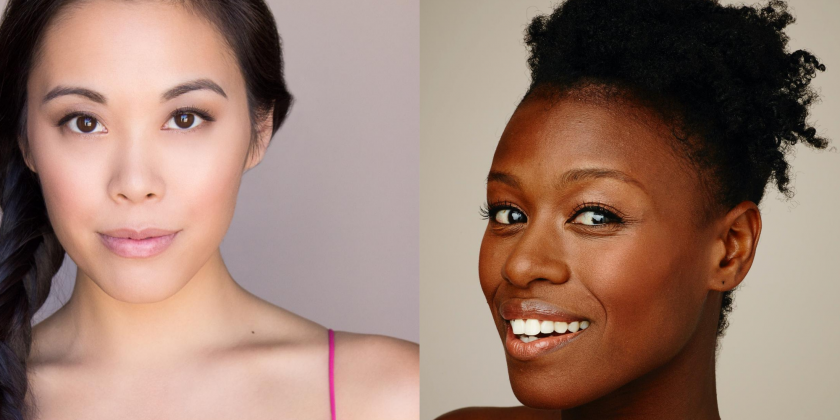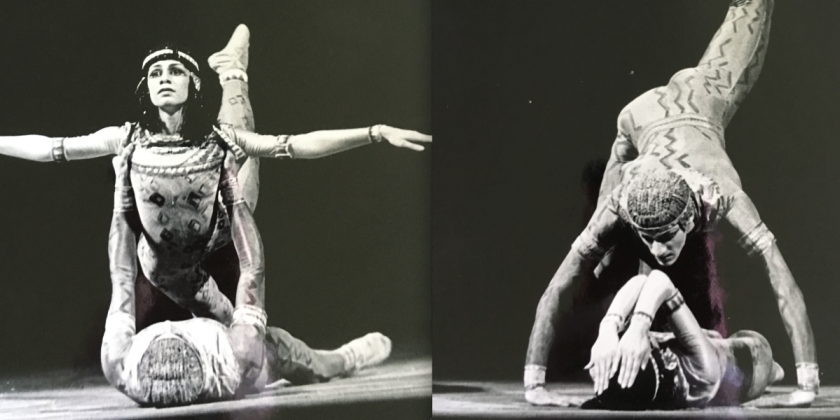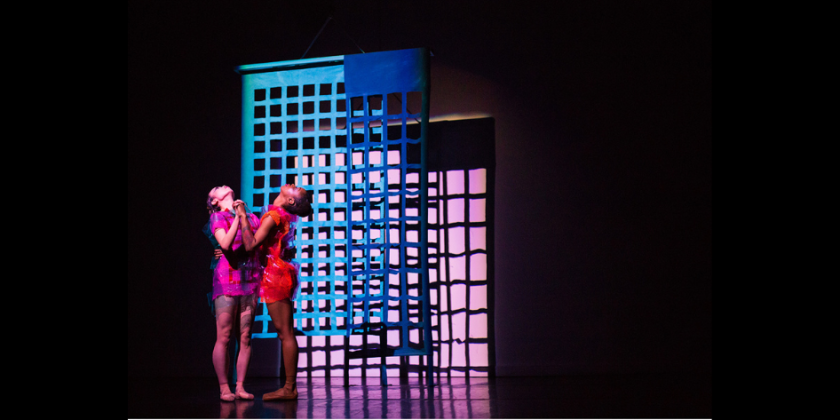The Dance Enthusiast Asks Brooke Ishibashi and Rachael McLaren about Be an #ArtsHero

From live-streamed concerts to virtual museum tours to finally diving into that 10-part documentary series, the arts have kept us sane throughout quarantine. However, the COVID-19 pandemic has massively impacted the Arts and Culture sector. Artists and arts organizations need tremendous support from the federal government if the industry is to survive. Arts and Culture not only add vibrance and joy to our lives; the sector majorly contributes to the U.S. economy. Economic data proves there can be no full American economic recovery without an Arts & Culture recovery. The Dance Enthusiast chatted with Citizen Organizers’ Brooke Ishibashi and Rachael McLaren about “Be An #ArtsHero,” an intersectional grassroots campaign to push the Senate to pass emergency Arts relief.
Video above — Be an #ArtsHero Challenge: BD Wong
Theo Boguszewski for The Dance Enthusiast: How do you define the "Arts and Culture sector"?
 that generates millions of American jobs. A pennies-per-capita annual investment has helped to leverage a nonprofit Arts industry of almost 100,000 organizations serving millions of citizens in every part of America. 10 U.S. airlines received $50 billion in CARES Act relief. Arts & Culture contributes a value-added of $265 Billion more to the U.S. GDP than the whole of U.S. Transportation. We need proportionate relief.
that generates millions of American jobs. A pennies-per-capita annual investment has helped to leverage a nonprofit Arts industry of almost 100,000 organizations serving millions of citizens in every part of America. 10 U.S. airlines received $50 billion in CARES Act relief. Arts & Culture contributes a value-added of $265 Billion more to the U.S. GDP than the whole of U.S. Transportation. We need proportionate relief.What specifically are you asking of the U.S. Senate?
BI: Be An #ArtsHero advocates that the Arts & Culture sector receives proportionate relief to the contribution to the U.S. Economy it provides.
-
Immediate extension of the Federal Pandemic Unemployment Compensation program (FPUC) until the crisis is over and all Arts & Culture institutions are safe to fully re-open.
-
100% subsidy for the COBRA program to protect workers’ healthcare, with eligibility extended to 36 months.
-
Relief should be administered by the National Endowment for the Arts, the National Endowment for the Humanities, the Corporation for Public Broadcasting, and the Institute of Museum and Library Services— public institutions best equipped with infrastructure to disburse funds quickly and directly to Artists, as well as Arts & Culture unions and institutions.
-
Guarantee that a fair percentage of relief be apportioned in direct grants and relief to individual Artists and small Arts organizations representing the underrepresented, oppressed, and marginalized communities in our country, specifically toward BIPOC, LGBTQ+, disabled, and the economically disadvantaged.
-
Allow all nonprofits fair access to government economic support in the Paycheck Protection Program, including labor unions.
-
Update the Qualified Performing Artist tax deduction, allowing creative professionals to keep more of their
 hard-earned money by deducting necessary business expenses from their taxes (now due in July).
hard-earned money by deducting necessary business expenses from their taxes (now due in July). -
Follow the lead of the U.K. and Germany and commit $43.85 billion in direct relief to Artists, their institutions, their unions, and all others who comprise the Arts & Culture economic ecosystem.
Be an #ArtsHero Challenge: Jenn Lyon
Can you share a bit more about the roots of this initiative? What voices came together to determine these specific asks?
BI: Jenny Makholm, Carson Elrod, and I came together when we realized no one was “coming to our rescue.” We’re arts professionals and activist-organizers who saw a need for a united, sector-wide coalition calling for Congress to allocate proportionate relief to the Arts & Culture sector. We seek to emphasize Arts &  Culture’s contribution to the economy, highlighting the human and financial toll of letting that contribution collapse. Furthermore, as this crisis has a disproportionately negative impact on BIPOC communities, we are advocating for direct relief that will serve and sustain marginalized, disadvantaged, and oppressed groups.
Culture’s contribution to the economy, highlighting the human and financial toll of letting that contribution collapse. Furthermore, as this crisis has a disproportionately negative impact on BIPOC communities, we are advocating for direct relief that will serve and sustain marginalized, disadvantaged, and oppressed groups.
What resources are currently available to artists and arts organizations (or have been available over the course of the pandemic) in the United States? What are the limitations of these resources?
BI: Federal Pandemic Unemployment Compensation program (FPUC) is currently available, but it runs out on August 1, which is why the Senate must act before then. Arts & Culture organizations were eligible for the PPP program for payroll, but many smaller organizations weren’t able to access the funds because of the way they were funded through ongoing relationships with banks. If future funds are allocated through trusted government institutions like the NEA and NEH, they can ensure that the funds get to the organizations who need it most.
The Actors Fund is an incredible resource for all Arts professionals and has been allocating massive numbers of grants to individuals nationwide. But the demand is so incredibly monstrous, we cannot rely on them alone to provide for the needs of 5.1 million workers who are employed in the Arts & Culture sector. 30 million people are relying on FPUC. When it expires, they will be at high risk of eviction, bankruptcy, illness due to loss of healthcare coverage, and worse.
.png)
These five arts organizations have closed forever due to COVID-19. The list grows longer by the day.
What is the status of this legislation?
BI: Congress is back in session now- the HEROES Act is likely being dismantled, so we are asking Senators to craft and pass legislation that will allocate direct relief to the Arts & Culture sector (that is proportionate to what other countries such as Germany and the U.K. are providing). The “Save Our Stages Act”  was just introducing by Senators Amy Klobuchar and John Cornyn, but it is a short-term solution (providing 6 months of financial support to “help keep venues afloat, pay employees and preserve a critical economic sector for communities across America.”) We need a long-term solution— a bandaid will not suffice when our entire sector is hemorrhaging.
was just introducing by Senators Amy Klobuchar and John Cornyn, but it is a short-term solution (providing 6 months of financial support to “help keep venues afloat, pay employees and preserve a critical economic sector for communities across America.”) We need a long-term solution— a bandaid will not suffice when our entire sector is hemorrhaging.
What are the potential consequences, both qualitative and quantitative, if this bill does not pass?
BI: When the Federal Pandemic Unemployment Compensation program (FPUC) ends on August 1st, 30 million Americans are at risk of eviction, bankruptcy, and illness due to lack of healthcare coverage. The COVID-19 pandemic and economic shutdown have had a disproportionate negative impact on marginalized communities. Of the 110 million Americans living in rental households, 20 percent (28 million) are at risk of eviction by September 30th, according to an analysis by the Covid-19 Eviction Defense Project, a Colorado-based community group. African American and Hispanic renters are expected to be hardest hit.
Rachael McLaren, Be An #ArtsHero Citizen Organizer: None of this is sustainable without the kind of financial support that will ensure that we can pay our rent, pay for healthcare, have support for food, our families, student loans and other vital expenses. Dancers use their entire being as their instrument. The training, maintenance and development never stops. We are an often overlooked but incredibly important part of the vitality of our community.
This pandemic is disproportionately affecting Black, Indigenous, and Latinx communities, and I think about those families and children that rely on the arts in education programs in high risk neighborhoods. Those who may not have access to online resources, or safe spaces to engage with resources at this time. This hurts on so many levels, and the effects will be lasting for many years to come. It's the arts that keep the spirits of our community high, that spread messages of our collective humanity. It is vital to the health of our community to support our Art community.
and the effects will be lasting for many years to come. It's the arts that keep the spirits of our community high, that spread messages of our collective humanity. It is vital to the health of our community to support our Art community.
Be an #ArtsHero Challenge: Tom Bardwell
What can I do as an individual to support this initiative? What about as an arts organization?
BI: Visit BeAnArtsHero.com to download the Action Packet for step-by-step instructions on how individuals and organizations can take the necessary steps to convince all 100 U.S. Senators to pass massive Arts relief by August 1st. Do #ArtsHero 1-minute video challenge. Sample script available HERE. Most importantly: make some noise and CONTACT YOUR SENATORS! Call, write, tag & tweet them. We provide graphics and letter templates and make it easy for you! You can make a difference with a 5-minute action. If a collective shout reverberates across the nation, we stand a real chance at saving the Arts economy and millions of Americans whose welfare and livelihood is at stake.











